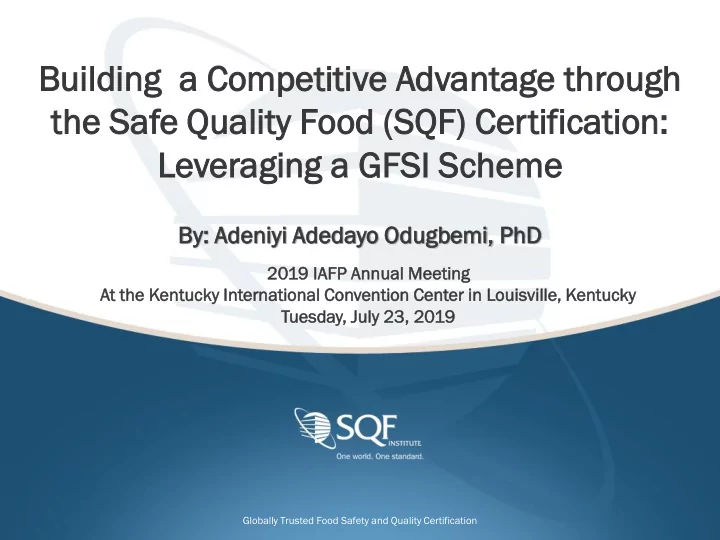

Bu Building lding a Com ompetitiv petitive e Advant antage age thr hrou ough gh the th e Safe e Qua ualit lity y Food d (SQF) F) Cer ertifi tification: cation: Leveraging eraging a GF GFSI SI Schem heme By: Adeniyi iyi Adedayo o Odugbe bemi, mi, PhD 2019 IAFP P Annual al Meeti eting ng At the Kentucky ucky Intern ernat ation ional al Conven enti tion on Center er in Louisv sville ille, Kentucky ucky Tuesda sday, July 23, 2019 Globally Trusted Food Safety and Quality Certification
Overview To discuss how the Safe Quality Food (SQF) certification (as a GFSI scheme) promotes competitive advantage in producing safe and quality food products based on a 2017 independent study.
SQF Journey • Started in Australia in the mid 1900s • First certificate was issued to grape juice producer in 1995 • SQF Institute was established in 2001 • 2003 Food Marketing Institute (FMI) bought SQF • FMI’s U.S. members operate nearly 40,000 retail food stores and 25,000 pharmacies, in the United States and around the world. • SQF Institute, a division of FMI, manages the SQF Program, • SQF has issued more than 9,000 certificates to suppliers in over 20 countries
SQF Concept • Recognized by the Global Food Safety Initiative (GFSI) • Leading global food safety and quality certification system • Designed to meet the needs of suppliers and buyers • Compliant with regulations in both domestic and global markets at all stages of the supply chain. • A pathway to produce safe and quality food products • SQF is the only GFSI benchmarked standard that provides certification for production, manufacturing, distribution and other food sector channels • Rigorous series of standards and best practices for producing food.
Benefits • Optimized operations (SQF Code guidance) - Comprehensive food safety and quality management system • Reduced audit duplication and redundancy • Due diligence – meeting customer expectations • Increases consumer confidence in food products • Consistency – eliminate food safety variations • SQF complies with all applicable food legislation • Explores new concepts and enhances customer prospects • Simplified audit and scoring process
Distinctive Features • Recognized worldwide • Differentiated food sector category modules • Promotes confidence in food safety, quality, and legality • Specialized training of personnel • Enhances your marketing image • Increases marketability, both domestically and globally • Complies with regulatory requirements • Minimal financial responsibility/implementation cost • The only GFSI scheme to integrate a quality component as well as food safety. • Branding - public directory of certified suppliers
Competitive Advantage • Only GFSI recognized program that applies to the entire supply chain - from Farm to Fork • Strict adherence to the SQF standards will help facilities to lower their risk factors • Increased level of consumer confidence through a transparent auditing protocol • Differentiation - Strong program that acts as defense against competition • The SQF Program helps reduce assessment inconsistencies and costs of multiple audits • Ensures a strong food safety culture through the audit approach 7
SQF Competitive Advantage Rigorous standards Comprehensive and practices farm-to-fork Continuous Improvements Trust, authority, and Brand protection due diligence and identity 8
Competitive Strategies • Operational excellence (Farm to Fork) o Superior programs, training, events, activities and excellent communication o Consistent growth o Satisfaction and loyalty • Continuous improvement o Program innovation, program promotions, expanding market visibility o Value added training programs • Value specialization is key o Differentiated food sector categories 9
2017 Independent study % of participants 10
11
12
13
CONC NCLUS USION ION The summary of key findings of this study are : • Passing the SQF certification provides credibility to the food operation. Possessing SQF facility certification proves due diligence of safe and • quality food operations. • Respondents are happy with this scheme and unwilling to investigate or adopt other GFSI schemes. • Passing the SQF audit and certification is not a guarantee of adequate food safety practices in a food facility. 14
CONCLUSION… • Respondents noted that correctly implementing the scheme in a food facility is vital to sustaining a culture of food safety and quality. • Respondents noted that good training programs with continuing- education classes for practitioners and key players in the SQF program in food facilities are currently lacking. SQFI should establish programs to hold site management more • accountable for support, commitment, and engagement in the SQF program on an ongoing basis. • Accountability from site management is needed to establish the full use of SQF certification in a facility, beyond passing the audit inspections 15
16
Recommend
More recommend